|
|
|
Sort Order |
|
|
|
Items / Page
|
|
|
|
|
|
|
| Srl | Item |
| 1 |
ID:
168282
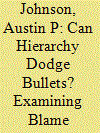

|
|
|
|
|
| Summary/Abstract |
The increased outsourcing of national security endeavors to private military companies (PMCs) raises questions concerning public evaluations of their performance and the extent to which government officials are held accountable. We use a survey experiment to test public blame attribution associated with a failed military operation that was conducted by either regular or private military personnel. Our findings suggest that there are multiple mediating pathways in the process of attributing blame in foreign policy. Furthermore, our findings suggest that contracting out military functions to a PMC can damage perceptions of performance, perhaps increasing blame attribution by the public. These impacts on the attribution of blame suggest that PMCs are viewed as inferior service providers by the mass public and politicians will be held accountable, directly or indirectly. Implications from our study add to the discussion on the outsourcing of military capacities which are rapidly expanding in the Western world.
|
|
|
|
|
|
|
|
|
|
|
|
|
|
|
|
| 2 |
ID:
168279
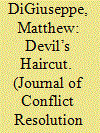

|
|
|
|
|
| Summary/Abstract |
When do private creditors versus debtor states accept a greater burden in resolving sovereign debt crises? In this study, we argue that distributive politics helps explain the “haircut”—or losses—private creditors take in debt restructuring cases. Despite the expected convergence of partisan policies in a globalized economy, we argue that right and left leaders extract different settlements in debt negotiations. Left governments, representing constituents most likely to be hurt from higher debt repayment, credibly demonstrate more bargaining power and extract greater concessions from creditors. Distributive politics, however, is an indeterminate factor in explaining states entrance into debt negotiations. We use recently released data on the outcome of sovereign debt restructuring cases between states and private creditors from 1975 to 2013 to test our expectations. Results from a double-hurdle model indicate that creditors receive a larger haircut when negotiating with left governments.
|
|
|
|
|
|
|
|
|
|
|
|
|
|
|
|
| 3 |
ID:
168278
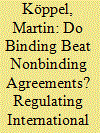

|
|
|
|
|
| Summary/Abstract |
Does the form of a multilateral agreement (MEA) by itself improve environmental performance? In particular, do legally nonbinding MEAs pose a rival to the effect of more traditional legally binding international agreements? Our theory builds on the legal and international regimes literatures and postulates that legally binding agreements (LBAs) have more benign effects on water quality than legally nonbinding agreements (LNBAs). We probe two operationalizations of the form of MEAs. First, we purely focus on the form: of legally binding versus legally nonbindings. Second, we combine the form of an agreement each with an index of precision and an index of delegation. The empirical focus is on upstream–downstream water quality in Europe during 1990 to 2007. Our regression analyses, regardless of specification, find that LBAs beat LNBAs and that LBAs with high degrees of precision and delegation beat the effect of any other configuration of agreements with respect to enhancing water quality.
|
|
|
|
|
|
|
|
|
|
|
|
|
|
|
|
| 4 |
ID:
168280


|
|
|
|
|
| Summary/Abstract |
Can counterterrorism security be counterproductive? We argue that it can be when the at-risk population acts strategically. We model a two-stage game where the government first chooses the defensive security level for a public place. The second stage is a simultaneous-move game with terrorist choosing terror effort and members of the population deciding whether or not to attend the public place. Our key measure of the efficiency of the counterterrorism security is the expected number of casualties. Under very standard and general assumptions, we show that it is possible that more security leads to an increase in that number. This is because increasing security both discourages and encourages the terrorist. On the one hand, more security makes a successful terror attack less likely (discouragement). On the other hand, more security motivates more people to attend the public place which makes the attack more valuable to the terrorist (encouragement).
|
|
|
|
|
|
|
|
|
|
|
|
|
|
|
|
| 5 |
ID:
168281
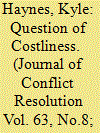

|
|
|
|
|
| Summary/Abstract |
This article examines how interstate signaling processes operate under multiple dimensions of uncertainty. The existing signaling literature largely assumes that states communicate and infer one another’s intentions in a simplified context where they are only uncertain about one component of the other’s preferences. Relaxing this unrealistic assumption, I develop a model of interstate reassurance in which the receiver is uncertain of both the compatibility of the sender’s goals and its time horizons. If a receiving state is unsure of the sending state’s time horizons, it is more difficult to determine the costliness of a given signal, and thus how credible it is as an indicator of the sender’s preferences. I show that under certain conditions, shorter time horizons lead to more credible signaling as states become less willing to incur the short-term costs of misrepresentation. Under other conditions, however, shortened time horizons can incentivize hedging behavior, thus undermining a benign state’s ability to credibly signal its intentions. Finally, the model reveals that multidimensional uncertainty can actually facilitate cooperation across a wider range of conditions than one-dimensional uncertainty. I present two brief case illustrations and discuss the model’s implications for contemporary US–China relations.
|
|
|
|
|
|
|
|
|
|
|
|
|
|
|
|
| 6 |
ID:
168277
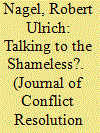

|
|
|
|
|
| Summary/Abstract |
To what extent, does sexual violence influence the likelihood of conflict management in intrastate conflicts? Despite a growing body of research that explores conflict-related sexual violence, the literature presents little insight on its effects on conflict resolution. Extending feminist international relations (IR) theory to intrastate conflicts and applying a gender lens to the power to hurt argument, I argue that when rebel sexual violence is public knowledge, the likelihood of conflict management increases because the state perceives it as a threat to its masculinity. I systematically test this argument on all intrastate conflict years from 1990 to 2009 using the Sexual Violence in Armed Conflict and the Civil War Mediation data set. The results provide robust support for the argument. This presents an important refinement of traditional rationalist conflict bargaining theories and opens new avenues for the research and practice of conflict management.
|
|
|
|
|
|
|
|
|
|
|
|
|
|
|
|
| 7 |
ID:
168276


|
|
|
|
|
| Summary/Abstract |
The current migration and refugee crisis in Europe requires an understanding of the different migration drivers beyond the well-known economic determinants. In this article, we view migration from a broader human security perspective and analyze the determinants of regular and asylum seeker migration flows from Africa to Europe for the period 1990 to 2014. Our results show that, in addition to economic determinants, a combination of push and pull factors influences migration decisions of individuals. In particular, rising political persecution, human rights violations, ethnic tensions, political instability, and civil conflicts in African source countries are all significantly associated with increased migration flows into European destination countries. Therefore, our results underscore the need for the European Union and European countries to collaborate with the source countries, not only in terms of supporting economic development in the source countries but also in promoting human security: human rights, democracy, peace, and social stability.
|
|
|
|
|
|
|
|
|
|
|
|
|
|
|
|
|
|
|
|
|